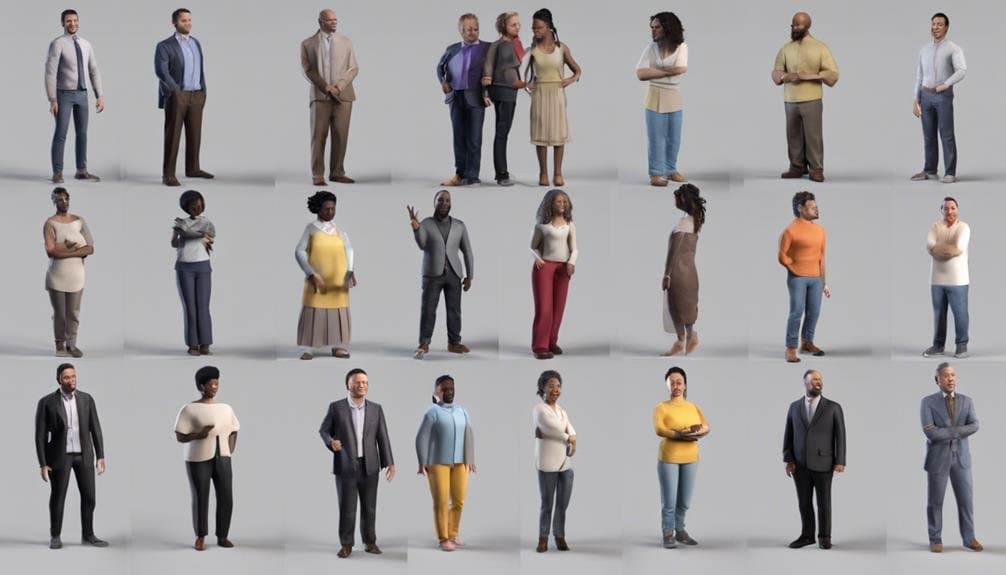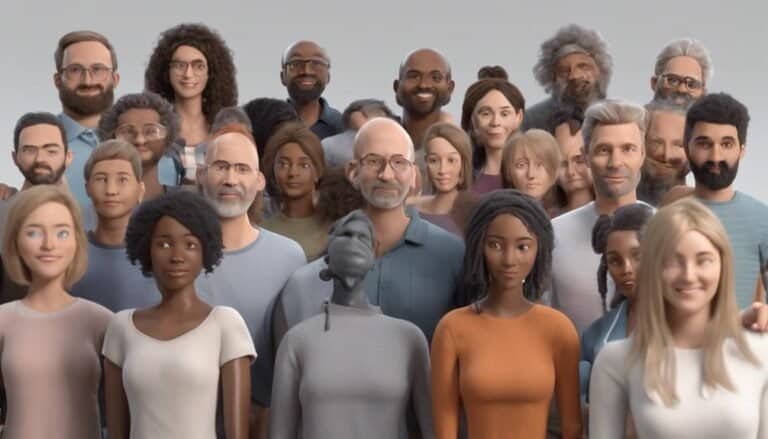Intercultural Competence as a Soft Skill
Mastering intercultural competence is essential as a soft skill. It involves cultural sensitivity, social intelligence, and adaptability. By embracing diversity, you gain global perspectives and enhance problem-solving skills. Challenges include respecting cultural norms and developing empathy. Strategies like active listening and cultural immersion foster mutual understanding. Embrace these skills to thrive in our interconnected world. Discover the secrets to success in bridging cultural divides.
Key Takeaways
- Cultural sensitivity and empathy are essential soft skills.
- Social intelligence aids in navigating diverse customs and norms.
- Demonstrating adaptability is crucial for effective communication.
- Intercultural competence fosters understanding and respect.
- Empowering connections through bridging cultural divides.
The Significance of Intercultural Competence
Understanding the significance of intercultural competence is essential in maneuvering the intricacies of a globalized world. Cultural sensitivity and empathy are at the core of this competence. By embracing these qualities, you can navigate through diverse cultural landscapes with grace and understanding. Having social intelligence is equally pivotal. It enables you to decode unspoken cues, norms, and customs, fostering smoother interactions with individuals from different backgrounds.
Adaptability is another key component. Being adaptable allows you to adjust your behavior and communication style to suit varying cultural contexts. It demonstrates your willingness to learn and respect different ways of life, ultimately strengthening your relationships across cultures. Intercultural competence empowers you to bridge divides and build connections with people from all walks of life. It enriches your experiences, broadens your perspectives, and opens doors to new opportunities. Cultivating these skills isn't just advantageous but necessary in today's interconnected world.
Key Components of Intercultural Competence
Traversing diverse cultural landscapes with grace and understanding involves mastering key components of intercultural competence. To navigate effectively in a globalized world, you must cultivate cultural sensitivity and enhance your cross-cultural communication skills.
Here are five essential components to develop your intercultural competence:
- Cultural Sensitivity: Being attuned to the nuances of different cultures helps you avoid misunderstandings and fosters respect for diverse perspectives.
- Open-mindedness: Embracing new ideas and ways of thinking allows you to approach intercultural interactions without bias or preconceived notions.
- Empathy: Putting yourself in someone else's shoes enables you to better understand their cultural background and respond appropriately.
- Adaptability: Being flexible and willing to adjust your behavior in response to different cultural norms promotes effective cross-cultural communication.
- Intercultural Communication Skills: Mastering the art of conveying messages clearly and sensitively across cultural boundaries is essential for building meaningful relationships and collaborations.
Developing Intercultural Competence Skills
To enhance your intercultural competence, actively engaging in cross-cultural experiences is key to developing a deeper understanding of diverse perspectives and communication styles. Cultural immersion allows you to step out of your comfort zone, exposing you to different customs, traditions, and ways of thinking. Through cross-cultural communication, you learn to navigate language barriers, non-verbal cues, and varying communication norms, fostering empathy and adaptability.
| Benefits of Cultural Immersion | How It Enhances Intercultural Competence |
|---|---|
| Exposure to diverse perspectives | Helps in understanding different viewpoints |
| Increased empathy and respect | Encourages tolerance and appreciation of differences |
| Improved communication skills | Enhances ability to navigate cross-cultural interactions |
| Adaptability to new environments | Develops flexibility in unfamiliar settings |
Benefits of Embracing Cultural Diversity
Embracing cultural diversity opens up a world of global perspectives, allowing you to see issues from various angles and broaden your understanding.
By fostering an environment that values differences, innovation thrives as unique viewpoints come together to create fresh ideas and solutions.
The benefits of cultural diversity extend beyond just tolerance, enriching experiences and pushing boundaries in ways that monolithic thinking could never achieve.
Global Perspective Advantages
With a global perspective, embracing cultural diversity can benefit individuals and organizations in today's interconnected world. Embracing cultural diversity can lead to a myriad of advantages, fostering growth and understanding in both personal and professional domains.
Here are some key benefits:
- Enhanced Creativity: Exposure to different cultures sparks creativity and innovation.
- Improved Problem-Solving Skills: Diverse perspectives offer unique solutions to complex problems.
- Increased Adaptability: Cultural awareness promotes flexibility in traversing diverse environments.
- Broader Market Reach: Understanding various cultures allows organizations to connect with a wider audience.
- Boosted Collaboration: Global mindset encourages teamwork, leading to more effective and harmonious collaborations.
Innovation Through Diversity
Diverse cultural perspectives ignite a spark of innovation that propels individuals and organizations towards new horizons of creativity and growth.
When different backgrounds come together, creativity flourishes through the blending of unique ideas and approaches. Collaboration within a diverse team often leads to groundbreaking solutions that wouldn't have been possible in a homogeneous environment.
Embracing cultural diversity creates an inclusive environment where every voice is valued and contributes to the collective innovation process. The mix of perspectives challenges traditional thinking and pushes boundaries, fostering a culture of continuous improvement and adaptation.
Challenges in Building Intercultural Competence
Understanding the significance of cultural awareness and recognizing the various communication barriers that can arise are key challenges in building intercultural competence. It requires a deep understanding of how different cultures perceive and interact with the world around them.
Overcoming these challenges involves actively listening, observing, and adjusting to guarantee effective cross-cultural communication.
Cultural Awareness Importance
Handling the complexities of cultural awareness is a fundamental challenge in developing intercultural competence. Cultivating cultural sensitivity and mastering cross-cultural communication are essential in this process. Here are some key points to ponder:
- Respect for Differences: Acknowledge and appreciate diverse cultural norms and practices.
- Empathy Development: Understand others' perspectives and experiences to bridge cultural gaps.
- Effective Listening Skills: Pay attention to verbal and nonverbal cues to enhance understanding.
- Open-Minded Attitude: Be receptive to new ideas and ways of thinking from different cultures.
- Continuous Learning: Stay curious and educate yourself on various cultures to improve intercultural interactions.
Communication Barriers Understanding
Traversing through communication barriers is a pivotal aspect in the journey of developing intercultural competence. Overcoming stereotypes and fostering effective communication are key components in this process. Stereotypes can lead to misunderstandings and hinder relationships between individuals from different cultures. By recognizing and challenging these preconceived notions, you can begin to break down the barriers that impede effective intercultural communication.
Effective communication involves not only speaking clearly but also listening actively and empathetically. It requires an understanding of cultural nuances, non-verbal cues, and the ability to adapt your communication style to different cultural contexts. Developing the skills to navigate through communication barriers will enhance your intercultural competence and enable you to build meaningful connections across diverse cultural landscapes.
Strategies for Enhancing Intercultural Competence
Developing a diverse network of individuals from different cultural backgrounds can greatly enhance your intercultural competence. To improve your ability to navigate cross-cultural interactions effectively, consider the following strategies:
- Cross Cultural Communication: Practice active listening and ask clarifying questions during conversations to guarantee mutual understanding.
- Cultural Sensitivity: Be mindful of cultural differences in non-verbal communication, such as body language and gestures, to secure mutual understanding.
- Diversity Training: Participate in workshops or courses that focus on diversity and inclusion to broaden your perspectives and ascend your cultural awareness.
- Cultural Immersion: Engage in cultural immersion experiences, such as traveling to different countries or participating in cultural events, to gain firsthand exposure to diverse traditions and customs.
- Continuous Learning: Stay curious and open-minded about different cultures, and actively seek opportunities to learn from individuals with diverse backgrounds to continuously expand your intercultural competence.
Conclusion
In essence, intercultural competence is a vital soft skill that can greatly benefit individuals in today's diverse world. By developing this skill, you can navigate cultural differences with ease and foster understanding among people from different backgrounds.
Embracing cultural diversity not only enriches personal growth but also enhances professional opportunities. Despite the challenges that may arise, employing strategic approaches can help you enhance your intercultural competence and navigate the complexities of our interconnected world.








